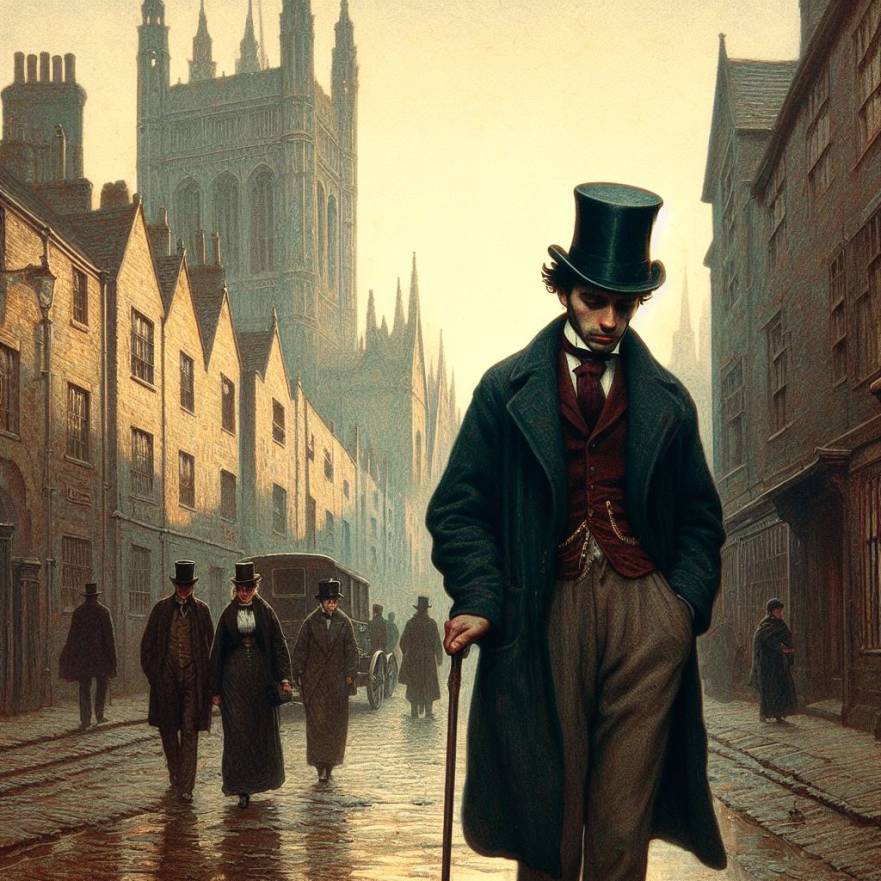A Way Away by Louis Philip DelGiacco

A Way Away by Louis Philip DelGiacco
I needed a gun to murder my wife. I’d tried everything else. The knife wounds healed within seconds. The shove down three flights of stairs seemed promising when she hit the landing in a twist of tangled limbs; but in less than a minute she had uncrumpled herself, with that icy, condescending voice, the one that only ever betrayed the slightest hint of annoyance, sighing: “Wendell Pumsley, you really must learn to control yourself, darling, those silly feelings of yours will be the death of you,”—as her hands snapped her head back into place with the unnatural crack of metal setting into bone. A cracking good crack, I suppose. I suppose…
No poison on Earth affected her indomitable constitution, thanks to the nano-mech/probiotic splicers and filter-screens; all of the chemicals needed to make an explosion significant enough to kill the beast had long since been removed from the marketplace, substituted with synth non-combustibles. I knew there must be a black market for these sorts of things, there must be criminals, after all—but I had no idea how or where to find them. The deep web had been scrubbed clean, the holos reported only of how we had “tamed the savageness of man and made gentle the life of this world,” to borrow a forgotten phrase. I’d been an amateur historian before the hobby was classified irrelevant and the archives were sealed; I’d seen the news-vids of the past, where chaos and crisis formed the core of man’s concerns. So, I wasn’t exactly a fool, but foolish enough—it’s not like I really cared about the lies. I just wanted to be happy. And happiness meant the end of her.
Divorce was out of the question. As I had no real grounds except for an empty heart, I would be deemed a ‘moral degenerate’ and exiled. To find otherwise would cast doubt on the perfection of the psych-scans and bio-matches that had bound us together in the first place. To even ponder the waiting game of ‘natural’ death was soul crushing. There was little ‘natural’ about us anymore. Seventy-eight years of marriage already, likely a century more to follow. And even then, the roulette wheel of oblivion might grind through me first. No, the only answer was a point-blank slug at the base of the skull. Complete neural and mechanical disruption. It was the one physical vulnerability that augmentation had left us with. Or at least that had been the case. I’d only known of this from watching news-vids covering the early days of the Ageless Age. Kill the ‘tangle’ at the base, and the body would die. I couldn’t be sure that the issue hadn’t been corrected. But I had to have hope. I had to believe that change was still possible, that something less than perfection could make me into something more.
Seven hundred days after reaching my conclusion I was still no closer to procuring the necessary weapon. In fact, I had done nothing about it at all. There was no hope of getting one through legitimate channels—gun permits hadn’t been issued in more than ninety years. And so, I was thinking about that on the tube home from work on one day or another—how difficult indeed it was to transfer ideas into tangible reality, and how ultimately useless ideas truly proved—when the connection presented itself. Back in my university days, I had made the acquaintance of one of the three remaining hereditary peers left in England—Sir Jeffrey Thatcher, whose title and wealth afforded him the luxury of eccentricity. It was through him that I learned of “poetry,” where men (and women, I suspect) would commit words to paper (!) for no definitive or legitimate reason other than to express their feelings. At the time, it was difficult for me to accept the existence of such apparently pointless indulgence—it was like painting windows onto concrete slabs of wall—and I had given no further thought to such rubbish until Sir Jeffrey Thatcher appeared that day in my mind, on my commute home, somewhere under Earl’s Court. Why did he wander in, uninvited, after all those years? I didn’t understand, but I knew—I knew he was somehow the key.
Finding him wasn’t a problem, but getting to him would be another matter altogether. The onenet indicated that he lived in the Brixton Estates, six square kilometers of walled privilege and seclusion better known as ‘Fort Brixton’ to those of us with less than a level nine citizenship designation. I had been there twice before on day passes for work and knew how onerous gaining entry to the secure zone would be. So, I would have to wait, like I’d been waiting all along, for an opening. But ideas suddenly seemed less pointless than before. I felt the Earth could be turning with me, and my dreams and the sun might ultimately align.
Sixty-four months later the notification flashed before my eyes. A small job in the Estates. The three hour pass uploaded as I kissed the dry, loveless lips that filled me with contempt and I hurried down the stairs, something like a smile cracking lines across my face.
London crawled and the tube rattled on before I arrived at my destination. Queued up at the border, and with a quick scan the Sentrymen waived me through as the clock began its countdown. Teet, teet… three hours and ticking… now ideas would be forced into motion, into being. I’d been studying the layout for years, and was ringing the bell at Sir Jeffrey Thatcher’s residence when the countdown hit 2:43. Teet, teet…
A grey man in a black suit with black eyes and a grey mouth greeted me at the door. I mumbled some nonsense about routine outlet checks, and he ushered me in. There was no need for scrutiny—within the walls, everyone was presumed to belong.
I saw him when I’d worked my way up to the sixth floor, as the countdown clicked to 2:19. I stood at the threshold of his study, his back to me as he hunched over a mahogany desk, a gray plume of wild hair jutting up towards the heavens from behind his chair.
“Jeffrey?” I asked, as if I was unsure of his name. I dialed up the endorphins with three blinks and a vertical dart of the left eye, afraid of buckling at the sight of my future. Everything was REAL, it was all too real, all too much, and I was flooding.
He swiveled around slowly and squinted as he looked me up and down, examining the curious artifact before him.
“Plumsley, isn’t it?” he said after a long silence. “Plumper Plumsley, wasn’t it? Scarcely fits you anymore. You’ve gotten too thin.”
Ah, yes. I’d forgotten the ‘plumper’ bit, and was less than ecstatic at its revival.
“Pumsley,” I said, as if the misplaced “L” really made a difference.
“Why yes, of course!” He stood with a leap and was shaking my hand and patting me on the back in three beats of my heart. “My good man, how have you been?”
I was slightly embarrassed when I realized that the totality of my life since university took no more than 2 minutes to unfold before him as the countdown settled on 2:14. He rang for brandy and I told him of the clock’s status and why I was allowed into the Estates and he chortled “nonsense,” and said he would sort it out as he left the room, directing me to take a seat in one of the Victorian armchairs and wait for the houseman.
I obliged, but not before examining the desk, covered with books and yellowing sheets of ink-marked paper, some of it in Latin, I think, some of it wholly unrecognizable.
Sir Jeffrey returned, still calling me ‘Plumsley,’ but there was no point in correcting him again.
“I say, Plumsley, how on Earth did you ever get into Uni with a citiz-class so low? Must’ve really aced those boards, eh? Well, I did the best that I could, a 24 hour extension, more than enough time for a bit of brandy. Never you mind about the work order, I told them they could send in some other bloody lackey, you and I have proper catching up to do.” The countdown was resolved with the reset, anti-climatically as always, like every other event in my life.
He was quite pleased with himself, one could tell, and I was relieved to have some breathing room. The grey man brought the brandy and left us with the bottle. For hours Sir Jeffrey regaled me with stories as he plied me with brandy, uttering variations of “there’s a good chap,” after I downed each one. He had been all over the world managing his family’s business interests, whatever they were, and talked endlessly of the cultural contrasts and differing mores throughout the globe and, more interestingly to him, of the countless women and men he had enjoyed on his exploits. Perhaps it was the alcohol; perhaps it was the growing feeling of inadequacy I felt while measuring the tedium of my years against the adventures of this libertine, but I suddenly blurted out:
“I need a gun to murder my wife.”
“Oh, Plumper,” he sighed, after studying his snifter. “What’s all this about?”
And so, I told him. About the emptiness in me. About the hatred in me. About the leash that choked my hope. And I was crying. I was actually bloody crying! Decades of numbness and repression crumbled away as the idea was finally spoken, set aloft in the world outside my brain to soar into reality.
He listened calmly and intently, placing a firm hand on my shoulder. “Oh hell, Plumsley, I’m sorry for all of that. But why have you come here, to me?”
That was more difficult to explain. The connection I made on the tube. No, that was wrong. Not that I made. The connection that found me. The connection that appeared on its own. Ideas. Emotion. Poetry? I don’t know. I stumbled inarticulately through words, trying to convey what I couldn’t even identify. Sir Jeffrey stood, rolling his eyes as he walked over to the desk and opened a drawer, interrupting:
“Oh for god’s sake, Plumper, stop your whimpering babble, here you are,” and he pulled a pistol from the drawer and tossed it toward me. “That was my great-grandfather’s, have it properly cleaned before you return it, will you? It’s loaded, so do be careful handling it. Now if you’ll excuse me, I have business to attend to. See yourself out, would you? Best of luck.” He took one last deep swig from his snifter and turned from me, returning to his desk. I felt foolish from the tears and didn’t know what to do with the pistol, so I wiped my face, cleared my throat and tucked the pistol into a sock. I cautiously navigated the five flights of stairs downward, stumbling a bit from the brandy.
She was asleep when I arrived home. I crept toward the bed in the darkness and grasped the pistol tightly in my hand. I stood there, watching her drool on the sheets as she snored, and prepared myself for liberation. But then it happened. Another flood in the brain. I saw her on our wedding day, as her eyes sparkled in the mid-day English summer sun. I watched her collapse to the floor in agony as our daughter’s embryo was deemed defective and the code was transmitted that would terminate our child. I felt the warmth of her breath as she whispered “You’ll do, Wendell, you’ll do nicely” in my ear for the first time, and the softness of her hair as she clung to me under the stars of an endless sky. I saw and felt all of this and more, countless images and sensations I’d pushed away. I felt monstrous. And pity… pity for the burden that I was. For all of my agonizing over ‘reality,’ it was me who was the lie. I grasped her right hand, crying again, and with my left hand angled the pistol behind me and pressed it up against the back of my neck. A sound like thunder parts my lips as I blow her one last frozen kiss, away…
Forty-two days later I awoke to silent blackness. The bullet had made a tangled mess of the tangle at the base of my skull. My vision was gone. Limbs useless. Hearing lost. They could still transmit muddy, rudimentary clumps of data into my brain, so I was aware when I was tried for moral degeneracy and convicted. But I paid it no mind. She was freed from the marriage and I was placed here, wherever I am, in this facility, in this darkened place. All transmission from the outside ceased. I document this now for no one, for myself, for everything, and for all. I murdered her, I murdered the whole bloody world, and no one had to truly die. I am no longer drugged awake in the static sleep. New worlds dawn at my whim, and more, for I am the architect of universes all my own. Suns rise through the clockwork oceans over latticework planets that spin apart and recombine; while underneath, my lovers twist up through deserts of glass and shatter the night skies into day skies into blinding orchid petals, caressed into clouds that collide like silk galaxies in duels of soft disintegration. Time and space and everyone pushing and everything pulling—all annulled. The filth and corruption of the senses has been vanquished. The slow death halted. If there is anyone listening in, know that I have found a way, away… forever and always, away.
* * * * THE END * * * *
Copyright Louis Philip DelGiacco 2024
























After finishing this marvelous tale I told a friend about it so he could enjoy it too. Treasures should be shared! This well written, original story took me by surprise and touched my heart. I even love the title. Wonderful. This is why I love literature. When it’s good it changes me, expands me, makes me feel the tickle of spreading wings that carry me where new worlds dwell, and I am more than I was before.
Thank you, Louis Philip DelGiacco!
Very kind of you to say, Dawn, and quite glad that you enjoyed it!